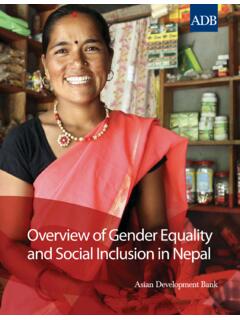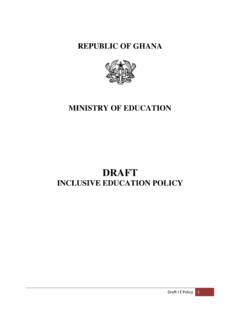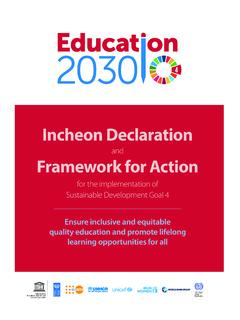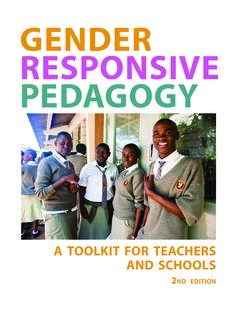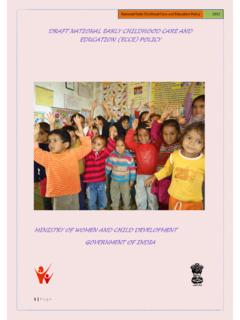Transcription of THE CONCEPT OF QUALITY IN EDUCATION: A REVIEW OF …
1 THE CONCEPT OF QUALITY IN education : A REVIEW OF THE INTERNATIONAL LITERATURE ON THE CONCEPT OF QUALITY IN education EdQual Working Paper No. 3 Angeline M. Barrett1 Rita Chawla-Duggan2 John Lowe2 Jutta Nikel2 Eugenia Ukpo1 1 University of Bristol, UK 2 University of Bath, UK 2006 ii EdQual RPC is a Research Consortium led by the University of Bristol UK and sponsored by the Department for International Development, UK.
2 The Consortium comprises: The Graduate School of education , University of Bristol, UK The Department of education , University of Bath, UK The Institute for Educational Planning and Administration, University of Cape Coast, Ghana The Faculty of education , University of Dar es Salaam, Tanzania The Kigali Institute of education , Rwanda The education Policy Unit, University of the Witwatersrand, Johannesburg, South Africa. EdQual also collaborates with the Institute for Educational Development, The Aga Khan University, Pakistan and the Instituto de Inform tica Educativa, Universidad de La Frontera, Chile.
3 EdQual runs research projects mainly in Africa, aimed at improving the QUALITY of formal basic education for disadvantaged groups. Our projects include: Implementing Curriculum Change to Reduce Poverty and to Increase Gender Equity Leadership and Management of Change for QUALITY Improvement Literacy and Language Development through Primary education School Effectiveness and education QUALITY in Southern and Eastern Africa The Use of ICT to Support Basic education in Disadvantaged Schools and Communities in Low Income Countries. For more information and other papers in this series, visit This Paper has been published by EdQual RPC and funded by the UK Department for International Development, although the views expressed are those of the Author[s].
4 Extracts from this Working Paper may only be reproduced with the permission of the Author[s]. EdQual 2006 ISBN: 978-1-906675-12-7 iii ABSTRACT This paper reviews key documents that have influenced understandings of educational QUALITY in low income countries amongst international agencies concerned with and researchers based in Anglophone countries. There is a particular focus on QUALITY as defined with reference to formal primary education . The paper identifies five dimensions of QUALITY that are recurring themes of debate on QUALITY . The literature REVIEW remains work in progress that will take on board more of the literature and thus develop over a period of time, both feeding into our research programme and being informed by it.
5 The paper starts by differentiating education from schools and argues that any framework to conceptualize educational QUALITY is necessarily value-based. Two broad approaches to understanding QUALITY are then outlined in Part 2 and a selection of key texts reviewed that falls into each approach. The humanist/progressive approach is characterised by a broad concern for the development of the whole child and human development or social change. The second broad approach, the economist approach, is largely concerned with efficiency and effectiveness, and the achievement of learning outcomes at reasonable cost.
6 Learning outcomes tend to be narrowly defined in terms of cognitive achievement. This approach is identified with the World Bank and two key Bank publications are reviewed. Part 3 summarises the conceptualisation of QUALITY implied in three education for All documents: the World Declaration on education for All, the Dakar Framework for Action and the Global Monitoring Report 2005: the QUALITY Imperative. These are found to take a broad approach to understanding QUALITY that emphasises learning for social development, through the promotion of Life Skills.
7 However, despite setting goals of QUALITY education in terms that embrace a broad range of personal and social learning outcomes, assessment of progress in achieving QUALITY is mainly restricted to those cognitive learning outcomes that are easy to measure using pen and paper tests. Part 4 complicates the dichotomous schema used to categorise understandings of educational QUALITY by drawing on Chitty s three concepts of schooling. These are schooling for human fulfilment, schooling as preparation for the world of work and schooling for social progress or change.
8 In part 5, the authors present five key dimensions to education QUALITY that have emerged from their reading of the literature. The conclusion poses questions raised by these five dimensions for the development of the EdQual programme of research. iv CONTENTS INTRODUCTION: AIMS AND LIMITATIONS IN THIS REVIEW .. 1 1: education AND SCHOOLING: AN IMPORTANT DISTINCTION .. 2 2: TRADITIONS WITHIN education AND DEVELOPMENT .. 2 The Progressive/Humanist Tradition QUALITY of Classroom Processes .. 3 Constuctivist QUALITY Beeby (1966).
9 3 Beeby (1966) The QUALITY of education in Developing Countries .. 3 Goals, Context and Agency Hawes & Stephens (1990) .. 4 Equity and QUALITY Sayed (1997) .. 5 The Delors Report (1996) .. 6 The World Bank and the Economist Tradition .. 6 The World Bank education Sector Strategy (1999) .. 7 3: THE education FOR ALL MOVEMENT .. 8 The EFA Global Monitoring Report (2005) education for All: The QUALITY Imperative .. 10 4: EXTENDING THE FRAMEWORKS .. 11 5: COMPONENTS OF A QUALITY FRAMEWORK .. 13 6: CONCLUSION .. 15 REFERENCES .. 16 1 INTRODUCTION: AIMS AND LIMITATIONS IN THIS REVIEW This literature REVIEW was undertaken with the aim of identifying interpretations of educational QUALITY in the academic and development literature from a wide range of sources.
10 The particular emphasis in our search for relevant material was on notions of QUALITY in the context of low income countries and disadvantaged groups within those countries. It was quickly realised that the volume of literature addressing the CONCEPT of QUALITY in education , either as its prime focus or as a component of a wider focus, is vast. Within the time and resources available it would be impossible to produce a comprehensive or exhaustive REVIEW at this stage. Instead, it became clear that a more realistic initial target would be to identify dominant definitions and uses of the CONCEPT of educational QUALITY that appear in this literature and to place these within some analytical frameworks.


